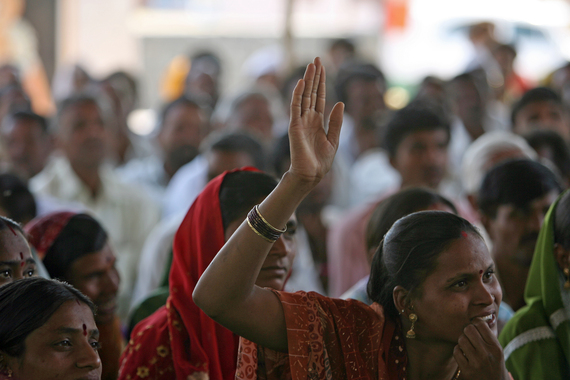In a private market--when I buy a sandwich--there is a direct or "short route" of accountability between the customer (me) and the sandwich provider. I pay her directly, I know whether I got a sandwich or not, and If I don't like the sandwich, I can go elsewhere--and the provider knows that. For [public] services the accountability becomes an indirect one, where citizens influence politicians for the services they want, and the politicians in turn have to influence service providers to deliver the services. There are now at least two places where accountability can break down.
In this quote, Shanta Devarajan, Chief Economist of the World Bank's Middle East and North Africa Region, describes the often longer "route of accountability" within the public sector, as compared to the private sector. The indirect relationship to the customer makes quality service delivery more complicated. In many developing countries, significant amounts of public funds are spent by governments and donors on public services (e.g. sanitation, health, and education) but government officials might choose to allocate the funding elsewhere and/or corruption causes the funds to disappear altogether. Moreover, even if funds are correctly allocated, they may be woefully inadequate or the services provided may be inefficiently delivered and/or of low quality.
When public health doctors or teachers fail to show up at work, they likely know that higher-level public officials are uninterested or unable to hold them accountable for their absenteeism. Mutual favors (e.g. voting for politicians) can play a role and if public officials act in their own interest, they usually lack political incentives to improve service delivery. In the end, citizens - especially the poor - bear the brunt of low-quality public services (a challenge some 'developed' countries also face to varying degrees).
Service delivery within the private sector is generally based on the understanding that success stems from listening to customers' preferences and adapting products and services accordingly. It may seem like a pretty straight-forward market-based approach, but in the public sector, the situation is often quite different as communication flows mainly top-down. If governments, service providers, and donors learned from the private sector and treated recipients of public services like actual customers, greater sustainable development could be achieved.
If public sector customers had communication channels they could use to exercise "voice" and pressure, they could also help shape performance incentives and alter political behavior. When citizens are empowered to actively hold politicians accountable, the likelihood increases that politicians in turn will hold service providers accountable. This two-way communication is particularly critical within the public sector as there are many places along the service delivery route where accountability can break down. More importantly, this open dialogue between citizens and government builds trust.
CITIZENS AT THE HEART OF SERVICE DESIGN AND DELIVERY
Although there are no quick-fix solutions to public service improvement, engaging citizens to provide service feedback and empowering them to exercise pressure is a fundamental stepping stone. While citizen engagement is not a new concept in the development community, it is still far from being the norm.
All too often, the poor end up paying disproportionally high prices for low quality services and incomplete projects. Governments and donors cannot continue rigidly applying already developed models for service delivery - it is time to design new governance models that place citizens at the heart of service delivery.
The poor end up paying disproportionally high prices for low quality services and incomplete projects. It is time for governments, public service providers and donors to place citizens at the heart of service delivery.
Global experiences suggest that social accountability tools can help ensure that governments, public service providers, and donors do more than pay lip service to their commitments by fostering genuine citizen-state collaboration. Good examples of this include facilitating legislation on access to information and training on utilizing the information for change. When citizens have access to government data -- and know to use it -- they can learn about their entitlements and find out how public resources are allocated and demand change.
We must not forget the critical role that the media plays in checking public spending, exposing corruption, and stimulating public debate. Through training, media practitioners can learn how to access and interpret public spending data and create narratives that are easily understandable for the public. There are numerous examples of how the "demystification" of spending data has ignited chain reactions leading to improved services and ultimately, improved development outcomes.
Finally, we should take notes from the private sector's success with customer feedback systems and customer response processes -- notwithstanding the known imperfections of some private sector practices. We can also acknowledge the immense progress many public sector institutions have made in this respect -- equally worth emulating! If governments and donors mainstream such customer/citizen-centric approaches more systematically within their programs, they'll be better able to "put the customer first" and improve development outcomes for all.
Follow Jeff Thindwa on Twitter: @JeffThindwa

